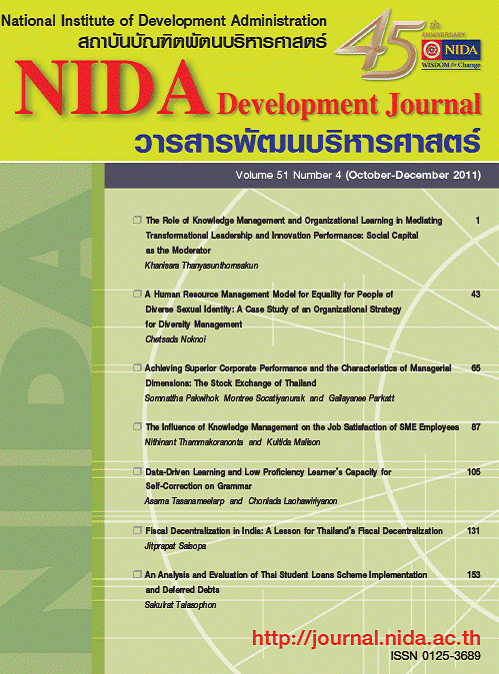The Influence of Knowledge Management on the Job Satisfaction of SME Employees อิทธิพลของการจัดการความรู้ที่มีต่อความพึงพอใจในการทำงานของพนักงานในธุรกิจ SMEs
Keywords:
Knowledge, Tacit Knowledge, Knowledge Management, Job SatisfactionAbstract
Knowledge is now used to create and to maintain the organization’s competitive advantage. Many companies have started performing knowledge management, which is thought to be able to help enhance the organization. In order to carry out knowledge management effectively, Information Technology involves relatively. This research studies how knowledge management influences job satisfaction. Knowledge management is considered as a process, that contains 5 activities: knowledge creation, knowledge accumulation, knowledge sharing, knowledge utilization, and knowledge internalization. This study collected data from small and medium enterprises located in Bangkok and vicinity. The data collected from the questionnaires suggest that some activities in the process of knowledge management, such as knowledge sharing, knowledge utilization, and knowledge internalization, have an influence on job satisfaction. This shows that many employees have no concern about knowledge creation or knowledge accumulation, or they do not give these two activities much importance. This implies that employees do not pay serious attention to knowledge management. This might possibly be because of human nature and the organization’s culture. Moreover, this study finds that knowledge sharing, knowledge utilization, and knowledge internalization must appear at the same time.
ความรู้เป็นทรัพยากรที่สำคัญที่จะทำให้องค์การยังคงรักษาความได้เปรียบในการแข่งขัน การจัดการความรู้จึงถูกนำมาใช้ในการพัฒนาองค์การ ซึ่งเทคโนโลยีสารสนเทศเป็นองค์ประกอบหลักที่สำคัญประการหนึ่งที่จะทำให้การจัดการความรู้ขององค์การดำเนินไปอย่างมีประสิทธิภาพ โดยงานวิจัยนี้ศึกษาอิทธิพลของการจัดการความรู้ขององค์การกับความพึงพอใจในการทำงานของพนักงาน โดยพิจารณาจากกระบวนการจัดการความรู้ซึ่งแบ่งออกเป็น 5 กระบวนการ คือ การสร้างความรู้ การสะสมความรู้ การแบ่งปันความรู้ การนำความรู้ไปใช้ประโยชน์ และการหาความรู้ภายใน โดยใช้บริษัทวิสาหกิจขนาดกลางและขนาดย่อม (SMEs) ในเขตกรุงเทพมหานครและปริมณฑล เป็นกลุ่มตัวอย่าง จากการวิเคราะห์ผลสำรวจโดยแบบสอบถามพบว่า บางกระบวนการของการจัดการองค์ความรู้ ไม่มีอิทธิพลต่อความพึงพอใจในการทำงาน มีเพียงแค่การแบ่งปันความรู้ การนำความรู้ไปใช้ และการหาความรู้ภายในองค์การเท่านั้นที่มีความสัมพันธ์กับความพึงพอใจในการทำงานของพนักงาน ทำให้ทราบว่าบุคลากรยังไม่ให้ความสำคัญกับเรื่องของการสร้างความรู้และการสะสมความรู้ หรือบุคลากรยังไม่ให้ความสำคัญกับการจัดการความรู้อย่างจริงจัง ซึ่งอาจเนื่องมาจากธรรมชาติของคนและวัฒนธรรมขององค์การ นอกจากนี้ยังพบว่า กระบวนการทั้งสามที่มีอิทธิพลต่อความพึงพอใจในการทำงาน จะต้องดำเนินการไปพร้อม ๆ กัน





